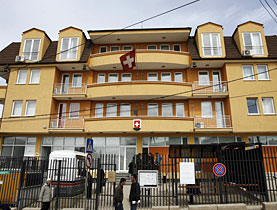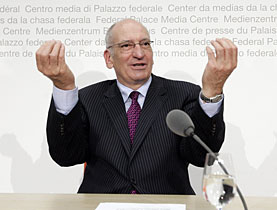Switzerland set to open embassy in Kosovo

Swiss Foreign Minister Micheline Calmy-Rey is to open an embassy in Priština on Friday, a month after Bern recognised the independence of Kosovo.
Her five-day visit to three Balkan countries – she has already visited Bosnia-Herzegovina and will go to Macedonia on Sunday – had sparked criticism that Bern has deliberately omitted Serbia from the itinerary.
But a foreign ministry spokesman said on Thursday that a visit to Belgrade had not been possible on this trip and that Calmy-Rey hoped to go to Serbia in the near future.
Switzerland will be the fourth country to open an embassy in Priština, after Germany, France and Britain.
A total of 30 countries have recognised the independence of Kosovo, which was announced on February 17.
Bern announced its decision supporting independence of the Serbian province ten days later, a move that immediately led to Serbia recalling its ambassador to Bern, arguing that it was an attack against Serbia’s sovereignty.
The inauguration of the embassy, which will replace Switzerland’s liaison office, is to take place in the evening, followed by an official reception.
Meetings
Calmy-Rey, who is the second foreign minister to visit Priština after Sweden’s Carl Bildt, met President Fatmir Sejdiu on Friday morning.
Sejdiu thanked Bern for its “long-standing” support of Kosovo and noted that Switzerland was home to the second-largest Kosovar community abroad, after Germany.
Calmy-Rey said Switzerland wanted to develop its support for Kosovo but warned the authorities in Pristina they had an obligation to respect the country’s different minorities.
She added that Bern had to renegotiate about 60 bilateral accords that were made with the former Yugoslavia.
Afterwards, she was due to meet the European Union’s special representative for Kosovo, veteran Dutch diplomat Peter Feith.
Feith is coordinating all EU activities in Kosovo, with special emphasis on the development of human rights and basic freedoms.
Calmy-Rey is also due to meet compatriot Tim Guldimann, who is head of the mission of the Organization for Security and Cooperation in Europe (OSCE).
She is set to visit bilateral cooperation projects with Kosovo and meet members of the Swisscoy military staff – Switzerland’s peacekeeping unit in the region.
Controversy
Calmy-Rey’s visit to Kosovo caused some controversy among parliamentarians in Switzerland.
Dick Marty, the head of the parliamentary foreign affairs committee, said there was no reason for the country’s foreign minister to visit Kosovo so soon.
However, Mario Fehr, a member of the centre-left Social Democratic Party, said the opening of the embassy in Priština was an “important political signal” that Switzerland was taking an active part in trying to secure peace and stability in the region.
The western Balkans have been a priority for Swiss foreign policy since the 1990s.
The Swiss Agency for Development and Cooperation (SDC) and the State Secretariat for Economic Affairs (Seco) have a joint budget of SFr67 million ($67.2 million) for the region this year.
swissinfo with agencies
Calmy-Rey began her five-day visit in Sarajevo, Bosnia and Herzegovina on Thursday.
She will spend Friday and Saturday in Kosovo, and Sunday and Monday in Skopje, Macedonia.
Switzerland is home to a sizeable community of people from the Balkans, of which 270,000 come from the three countries included on this official visit – Kosovo, Macedonia and Bosnia-Herzegovina. There are also about 40,000 Serbs in Switzerland.
Kosovo unilaterally declared independence from Serbia on February 17 after internationally led talks to reach a mutual agreement on status failed.
Switzerland recognised Kosovo’s independence ten days later on February 27.
Calmy-Rey had been an open and long-term supporter of independence for the country.

In compliance with the JTI standards
More: SWI swissinfo.ch certified by the Journalism Trust Initiative










You can find an overview of ongoing debates with our journalists here . Please join us!
If you want to start a conversation about a topic raised in this article or want to report factual errors, email us at english@swissinfo.ch.